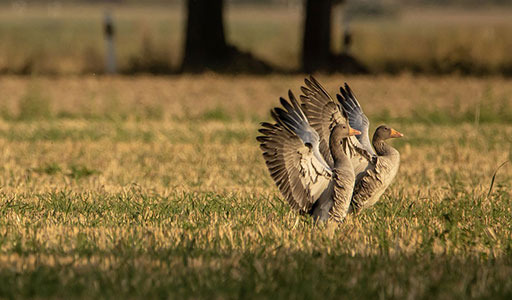Geese Removal
Do you need to get rid of Geese? We can help!

Geese Removal Strategies
If you have a problem with geese on your property, don’t risk your safety trying to remove them. At Trutech, our licensed specialists have the tools and knowledge that it takes to safely conduct a geese removal on your property. Our humane traps and other geese control services will solve your geese problem without harming any animals in the process. At Trutech, our first priority is keeping your family and pets safe and giving you back your peace of mind.
So, whether you are searching for geese control, trapping, or removal services, you can be confident that you are doing it in the most environmentally sensitive way thanks to the experts at Trutech. Don’t wait until geese have destroyed your yard, call Trutech today for help solving all of your wildlife removal needs.
Hear what a Geese sounds like
Geese Problem

Signs a Geese is on Your Property
The Canada goose is a large wild bird native to the northernmost regions of North America. Geese can cause large problems for homeowners in both urban and suburban areas. On your property, flocks of geese can make a lot of noise and can disrupt your everyday life quite easily. Geese will wander into more residential areas in search of grass, grains, and aquatic plants to consume. However, if you feed geese that show up on your property, they are more likely to return. Geese may bite if they come in contact with small children or animals on your property. When flocks of geese arrive on your property, they can cause issues in the form of defecation.

Dangers of Geese Infestation
Although normally harmless, Canada geese can be aggressive and bite people who appear threatening or stray too close to their nests. The biggest reason for their nuisance status is their excrement. A flock of 50 geese can produce over two and a half tons of droppings in a single year, which leads to serious problems if the flock is located in a public park, yard, water reservoir, or golf course. Water sources can even become contaminated with geese excrement.
Humane Geese Removal & Control Strategies

Entry into property
Geese do not enter buildings, but they may enter yards that contain ponds or other sources of water. Their diets often lead them onto yards or farm properties in search of meals. Canada geese tend to become permanent residents where people feed them.

Trapping & Removal
Since Canada geese are federally protected under the Migratory Bird Treaty Act, people should seek professional help when dealing with nuisance goose problems. Trutech wildlife experts are armed with the proper equipment and knowledge to trap, remove, and eliminate troublesome geese.

Prevention & Exclusion
To prevent Canada geese from roosting in ponds located near residential properties, individuals can erect fences around the water’s edge. Certain scare tactics may also be used to spook the geese away, such as hanging strips of reflective Mylar or placing balloons with large eye spots near common geese roosts or feeding grounds. Crops may be protected by stringing wires overhead, which confuses the geese and prevents them from landing in fields. Removing vegetation from around sources of water and ceasing direct feeding activities also convinces the geese to seek new places to stay.
Frequently Asked Questions
Gardens are hotspots for geese infestations. The pests keep seasonal diets, eating various types of grasses in the summer and grains, seeds, and berries during the winter. As such, gardens offer them access to food year round. Unless property owners have erected fences or employed the use of frightening devices, geese are able to wander right up to gardens and start feeding.
Geese are mostly problematic because they defecate excessively. Their feces accumulate at an impressive rate. The presence of goose excrement is detrimental to the health of residents because it can contribute to the spread of diseases like histoplasmosis, psittacosis, E. Coli, and salmonella. Geese in the garden also have a negative effect on plant health.
Geese like to build nests near water even though they spend most of their time on land. They are drawn to private properties for the abundance of grass, their main source of food, and easily accessible bodies of water such as rivers, streams, ponds, and even swimming pools. Unless pools are covered, geese are able to easily fly into them and splash around. The pests use pools to bathe and as breeding grounds.
Wherever there are infestations of geese, there is also geese excrement. While swimming in pools, the pests defecate and contaminate the water. Though chlorine helps kill off harmful bacteria, it doesn’t completely stop the spread of diseases like salmonella, campylobacter, and E. coli. Their waste leaves hard-to-remove stains on the bottoms of pools and decks, as well. Geese in the pool will consider the area their territory and might become aggressive when people or pets get too close.
Since they primarily feed on grasses, geese are drawn to residential lawns. These spaces also usually have water sources nearby, such as ponds, rivers, or swimming pools. Furthermore, private lawns and yards are typically free of most natural predators like wild cats and coyotes. Geese use the lack of predators, as well as the abundance of food and water, to their advantage and set up nests in residential areas.
Adult geese are easily able to fly onto roofs and set up nests. They choose these locations for protection, as the high altitude gives them an advantage over any approaching predators. Additionally, the close proximity to humans gives the pests consistent access to sources of food and water.
Having a goose on the roof can cause several issues. Geese will eat tar and other roofing materials, which compromises structural integrity. Furthermore, their droppings accumulate in large amounts. The acidity in geese excrement also eats away at roofs and clogs drains. In fact, the longevity of roofs can be cut in half by the presence of goose droppings.
The pests may also mistakenly fly into chimneys and find their way into homes. Additionally, geese can spread a number of parasites, bacteria, viruses, and fungi.


